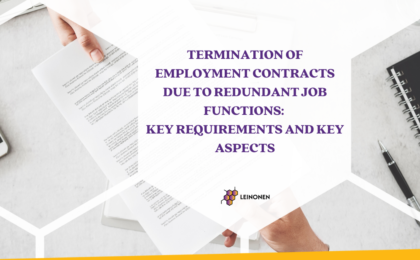The chain transaction is considered a group of transactions, when not only the supplier and the customer participate, but also one or few intermediaries (i.e. the intermediary/intermediaries purchase the goods from the supplier and resell them to the final customer) participate and all transactions are related by a single delivery, i.e. the goods are transported directly from the supplier to the final customer.
21 February 2018 the European Union Court of Justice (EUCJ) ruled in case C-628/16 Kreuzmayr GmbH, which approved provisions that the customer does not have the right to deduct input VAT according to the incorrectly issued VAT invoices.
This decision demonstrates, that the companies purchasing goods should also evaluate the circumstances of the transaction and ascertain that the transaction is formalized in a correct way. If the business partner incorrectly applies local VAT, the company does not have right to deduct such input VAT.
Additionally, we would like to note that the assessment of the reliability of business partners becomes more relevant to each company and may help to reduce the risk in international trade.
The circumstances of the case
The case analysed the situation with chain transactions, i.e.:
- the supplier A (German company) sold goods to a company B registered as a VAT payer in Austria (intermediary);
- the intermediary B sold goods to the final customer C (VAT payer in Austria), intermediary B has not informed about this transaction the supplier A and has not fulfilled its obligation to deliver the goods from Germany to Austria itself;
- final customer C has delivered goods from Germany to Austria.
The following VAT invoices were issued according to these transactions:
- the supplier A has issued the VAT invoices to the intermediary B with 0% VAT rate (intra-Community supply to another EU country);
- the intermediary B has issued the VAT invoices to the final customer C applying local Austrian VAT (local supply in Austria);
- the intermediary B has not paid VAT to the Austrian Tax Authority according to the VAT invoices issued;
- the final customer C has paid to the intermediary B according the VAT invoices issued and deducted input VAT according to the VAT invoices issued in Austria.
The EUCJ has determined that the transaction was not treated correctly, i.e.:
- the supply of goods from the supplier A to the intermediary B should have been considered as a local supply of goods in Germany (i.e. the supplier A should have applied the local German VAT rate for the transaction);
- the supply of goods from the intermediary B to the final customer C should have been considered as an intra-Community supply of goods from Germany to Austria (i.e. the intermediary B should have applied 0% VAT rate for the transaction).
After evaluating the circumstances of the case, the EUCJ stated that the intermediary B and final customer C knew that the rights to dispose of goods was transferred in Germany, i.e. the final customer C could dispose goods as their owner before their delivery in the EU.
Due to the incorrect treatment of the transaction, both the supplier A (had to calculate and pay calculated VAT from the transaction) and the final customer C (had lost right to deduct VAT according to the VAT invoices issued incorrectly) suffered losses. The intermediary B became insolvent and the final customer C could not receive a refund of overpaid amounts (i.e. incorrectly calculated VAT) from the intermediary B.
The details of the case can be found:
http://curia.europa.eu/juris/document/document.jsf;jsessionid=9ea7d2dc30ddda430396e09d46b7ba0e85eb67762b72.e34KaxiLc3qMb40Rch0SaxyNbhr0?text=&docid=199507&pageIndex=0&doclang=EN&mode=lst&dir=&occ=first&part=1&cid=505740




